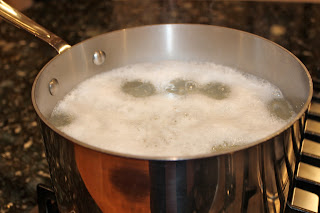This recipe is adapted from Nigel Slater's Real Food, a book I picked up at Tom & Jessica's that Angela (Jessica's sister) had discovered while she was studying in the UK, where's he's a well-known celebrity chef. The photos in the book are gorgeous close-ups (even closer than this one) that are absolutely seductive. The recipe, which I will mostly quote with some explanations, is delightful for it's British syntax. Once you've tried it, you won't really want potatoes any other way.
You will note that this recipe has the absolutely fewest ingredients of anything you will cook. Basically it's potatoes, salt and olive oil. Actually, two kinds of salt, one for salting the water you cook the potatoes in and a larger grained finishing salt at the end. With so few ingredients, it pays to use the very best you can afford. I like to use my Olio Santo, a California extra virgin olive oil
and Fleur de sel, a sea salt harvested at the Ile de Re in France,
both available at Williams Sonoma. Last Christmas, Mom gave me this beautiful olive wood salt container with a magnetic lid that I keep handy for finishing salt.
I'm going to quote Nigel Slater, because that's part of the fun of this recipe. You'll see.
ROAST POTATOES
"The difference between a good roast potato and a sublime roast potato depends on your willingness to put in a little bit of effort. The best roast spuds--by which I mean the crispest, gooiest, stickiest roast spuds--are those you take the trouble to give a quick boil in salted water before you roast them. After boiling and a gentle rough and tumble, the potatoes will soften just enough to fray and crush a little along the edges. When roasted in the hot fat, they will sport the rustling, crusty edges and melting interior that distance the sublime roast potato from the merely good one."
[I just love the use of language. It's illustrative and playful at the same time.]
"Serves 4
900g (about 5) large, floury potatoes, such as King Edward [Russets will do just fine]
fat from the roast or lard or dripping [Here I use the very best olive oil I have]
[Preheat oven with the baking sheet you will be using to 400 degrees F...he says 200 degrees C which converts to 390 degrees, but I think 400 is a little better]
Peel the potatoes and cut them into pieces large enough for you to have to take two bites at.
Any smaller and they will be all crust and no spud. Put them in a saucepan of cold water and bring to the boil.
Add salt, a teaspoon or so, and turn down to a frisky boil. Leave them cooking for five minutes, then drain them.
Tip them into the roasting tin in which you are roasting the joint. (If you are not roasting a joint, use a shallow metal tin in which you have heated enough lard, dripping or even olive oil to form a thin layer on the bottom.) [I use my best olive oil]
Roll the spuds in the fat,
then roast...until thoroughly golden and crisp. A good forty-five minutes, maybe longer [I like 50 minutes]. Move them only once or twice during cooking, otherwise the edges will not crisp and brown.
[This photo is at the half-way point when I turned them over, and the bottoms were already nice and brown]
Tip off any extra fat, crumble sea salt over them and send them back to the oven for a few minutes till they are deep, golden brown."
I think my favorite phrases are "a frisky boil," "roasting the joint," and "tip them into the roasting tin." We really don't eat large hunks of roast meat (the joint), but you will lose nothing in flavor roasting them in olive oil.
So. This is probably the easiest recipe I'll ever post. No excuses. Try it.














No comments:
Post a Comment